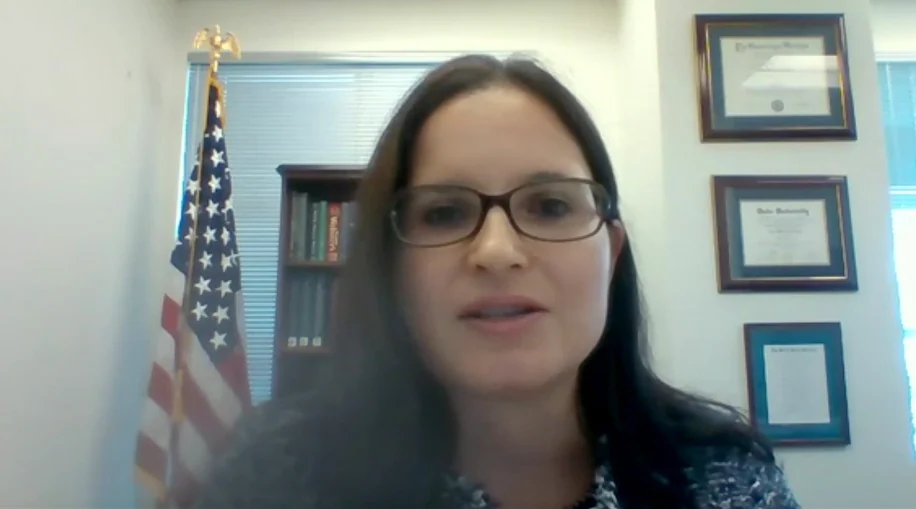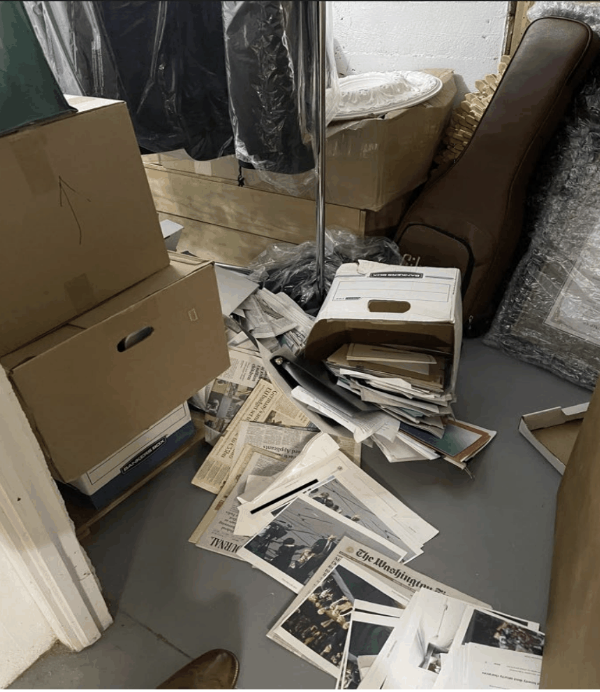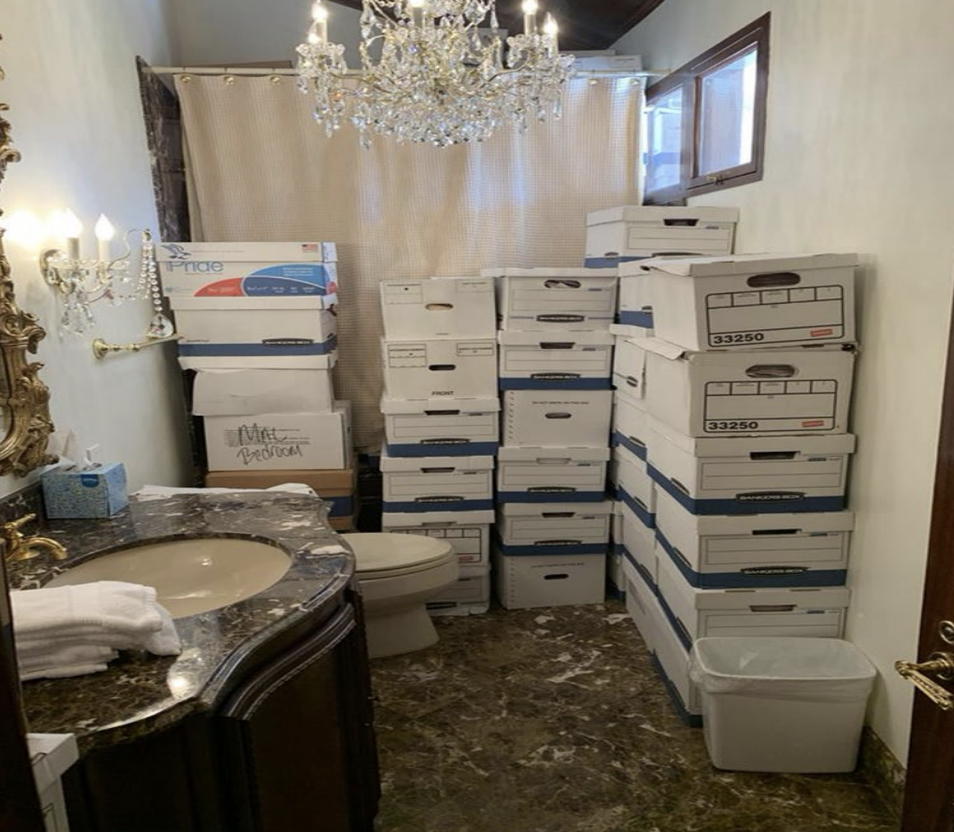This post talks about what the government filing in the Trump stolen documents case says about the evidence. This other post talks about the legal argument against a delay.
As I noted, Trump’s response to DOJ’s bid for a December trial made an argument for complex designation, based in part on the volume of evidence involved. If that argument convinces Aileen Cannon, Trump is more likely to get her to order a significant delay.
It’s a reasonable argument — and would be more so were the discovery burden as onerous as Trump laid out.
But at least according to the government’s reply, it’s not. Not even close. The government reply shows how Trump inflated these numbers and how the government has streamlined the discovery process.
Whereas Trump claimed there were 800,000 pages of evidence,
Therein, the Government produced more than 428,300 records (in excess of 833,450 pages) consisting of approximately 122,650 emails (including attachments) and 305,670 documents gathered from over ninety (90) separate custodians.
DOJ noted that only about 4,500 of that is “key” to the case and a third of that consists of email headers involving two people.
Although the Government’s production included over 800,000 pages, the set of “key” documents was only about 4,500 pages. 2
2 Nearly one-third of the over 800,000 pages consists of non-content email header and footer information obtained pursuant to 18 U.S.C. § 2703(d) for two account holders.
Whereas Trump complained about 57 terabytes of surveillance footage,
The initial production also included some 57 terabytes of compressed raw CCTV footage (so far there is approximately nine months of CCTV footage, but the final number is not yet certain).
DOJ explained that while the footage might be selected from across nine months of time, here, too, DOJ has selected the key bits and “many” of the cameras don’t record continuously (which means some do, which would be stuff obtained since the August search).
The Government similarly identified to the Defendants a small subset of “key” CCTV footage referenced in the Indictment or otherwise pertinent to the case. See id. And although the CCTV footage the Government obtained and produced comes from various months, the Defendants’ characterization of the production as including “nine months of CCTV footage,” see Resp. at 4, is misleading. The Government obtained footage only from selected cameras (many of which do not continuously record) from selected dates throughout the period for which it obtained footage
This argument may well make or break the government’s bid for a timely trial, because they’ll need to refute Trump’s complex designation bid to keep on a tight schedule.
And that’s one of many reasons (another is to make sure Trump and, especially, Walt Nauta can see what else they might be looking forward to) why they’re basically providing everything up-front, include Jencks production reflecting what witnesses have said about this case, which they’re not obligated to turn over until the morning of trial. And they’re providing every witnesses’ testimony, not just those they’re calling at trial.
The Defendants also rely on the Government’s statement in its discovery letter that “there will be additional productions of discovery” related to some devices and search warrant returns, and note that “the Government has not produced all interview-related materials, including certain witness statements and associated memorialization of those statements.” Resp. at 4. Defendants omit representations in the Government’s discovery letter about the timing of discovery that has been and will be provided. The Government has informed the defense that it intends to disclose promptly all witness statements and associated memorialization of those statements, even if they would not be discoverable under 18 U.S.C. § 3500. To that end, the Government has already produced all unclassified witness statements and the associated memorialization of those statements for interviews that occurred prior to May 12, 2023, and transcripts of all grand jury testimony from the District of Columbia and the Southern District of Florida through the present. See ECF No. 30 at 1. In the next week, the Government will produce unclassified witness statements and associated memorialization for interviews conducted between May 12, 2023, and June 23, 2023. The Government has made these productions promptly following arraignment despite having no obligation to do so. See ECF No. 28 at 4, obligating the Government to turn over Jencks Act material no later than “the morning of the first day of trial.”
With respect to the devices and search warrant returns, the Government has produced all applications for search warrants and the warrants themselves, in order to facilitate the Defendants’ ability to file pretrial motions. The Government has also produced all relevant content from devices it obtained, except for (a) three devices that were produced voluntarily, the relevant content of which will be produced in the next week; and (b) two of Defendant Nauta’s devices. For Defendant Nauta’s devices, the Government has already produced much of the responsive filtered, scoped content based on the Government’s earlier review of the devices’ content in a different form. In short, the Government has promptly produced thorough discovery in an organized manner, to include early production of Jencks Act materials. It also bears emphasis that the Government has already sought a nearly four-month continuance of trial, in part because of the need for both sides to review and process discovery. Mot. at 3. There is no discovery-related reason to further delay the jury selection in this case beyond December 2023. [my emphasis]
The government really did have this prosecution all prepped to go.
The rest of this, while also intended to help persuade Judge Cannon that the government has done everything it can to facilitate discovery here, provides a few interesting details about the case.
First, one of the last things the government is turning over are the three devices produced voluntarily. These probably came from a cooperating witness or witnesses, and if that’s right, DOJ may have held them until everyone had filed their appearance and signed a protective order, since any cooperating witnesses are most likely to be targeted for harassment.
The government seems to have seized two of Walt Nauta’s devices recently, possibly with arrest. The government seems to think they had most of this content already (perhaps from a backup). The phones themselves might include Signal or other encrypted app primarily available from the phones themselves.
The timing described is the most interesting thing:
- The first batch of discovery included everything prior to May 12, around when Jack Smith decided to charge this in Florida
- The government is about to turn over everything between May 12 and June 23
- It has already provided all grand jury testimony from grand juries in DC and SDFL
Note the last bullet: You don’t need to specify that you’re referring to the DC and SDFL grand juries if they are the only ones.
Indeed, the scope of that discovery suggests DOJ may have started with a third grand jury after June 23. It’s not even — necessarily — New Jersey (though that’s the most obvious possibility). If evidence was altered in New York, it could be there too.
The government has provided Trump and Nauta virtually every unclassified thing they’d need to defend this case and bundled it up to make it easy (which, again, will also make it easier for Nauta to decide whether he really wants to risk his future on Trump winning the 2024 election).
The hold-up now is that at least two attorneys have not submitted their SF-86 forms to get clearance — which, the government helpfully notes, are due today: “The Court has set a deadline of today for them to do so. ECF No. 57.”
Meanwhile, any other hypothetical grand juries can keep working.
Update: Both Trump and Nauta’s lawyers have submitted their certificates of compliance with Judge Cannon’s order that they submit their SF-86 forms by yesterday. Chris Kise, who is the lawyer who may be disqualified from clearance (because he has recently worked as an agent of Venezuela’s government), technically did not comply: he still has to be fingerprinted, though promises that will be done by next Monday. Meanwhile, Nauta’s lawyers have laid the groundwork for a 6th Amendment challenge to the requirement that they get clearance. It’s an interesting issue, but he’s being disingenuous about why Judge Cannon (separation of powers) and the jury (because they only see things after CIPA has been finished) don’t need clearance.
Update: ABC reports that the guy who handled the surveillance video has received a target letter.
Special counsel Jack Smith in recent weeks transmitted a target letter to the staffer indicating that he might have perjured himself during a May appearance before the federal grand jury hearing evidence in the classified documents probe, the sources told ABC News.
[snip]
Reached Thursday by ABC News, the employee declined to answer questions about a possible target letter and his discussions with investigators, saying only, “It’s none of your business.”
Stanley Woodward, a lawyer who has represented the employee and who represents several other Trump advisers, declined to comment to ABC News.
By description (see this post for background), this is the IT contractor Yuscil Taveras (whom NYT described to be represented by Woodward) not longtime maintenance guy Carlos Deoliveira (whom WaPo described to be represented by John Rowley).
This makes the timing of the discovery more interesting. The government is about to turn over DC grand jury materials and other interviews from after May 12 — that is, they haven’t yet turned over Taveras’ to Woodward. That suggests they may be about to charge him before they turn that over.
Taveras testified to the DC grand jury, so if he is charged with perjury, he’ll be charged there.
This likely complicates Woodward’s life significantly.





